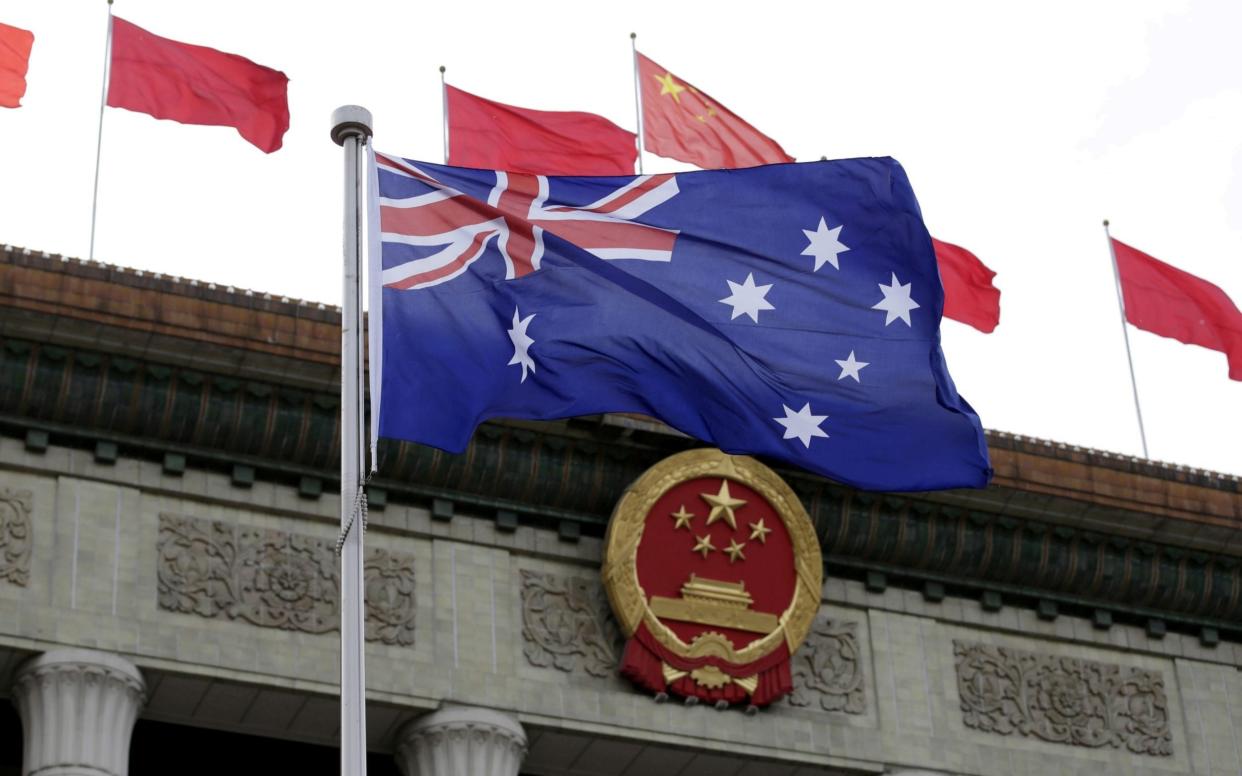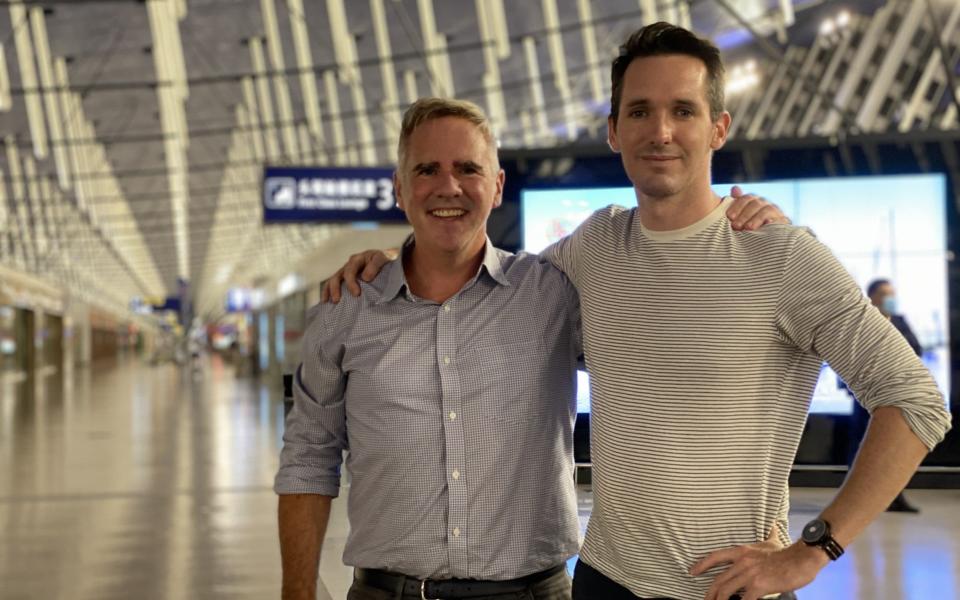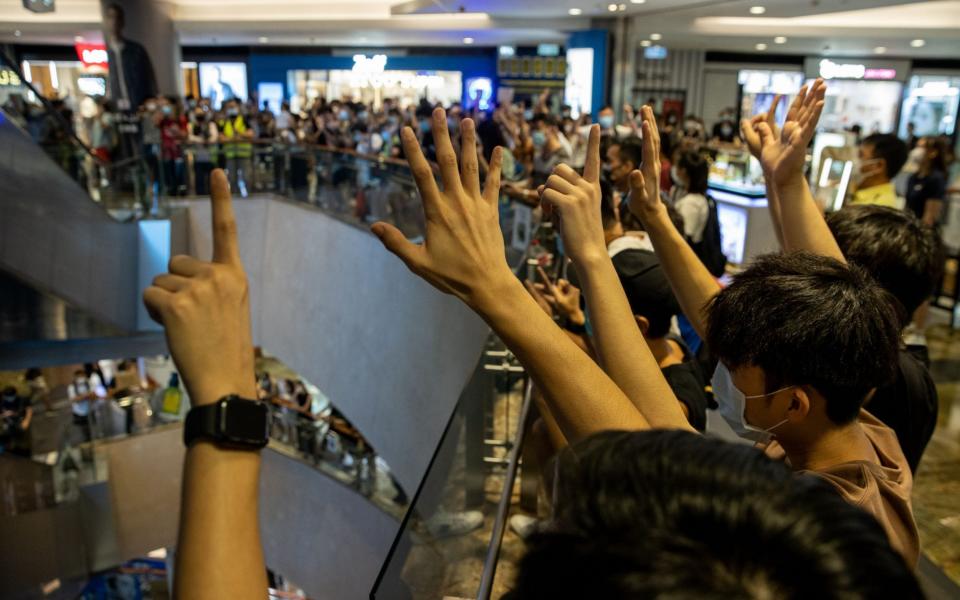Pressure mounts on foreign media in China after evacuation of Australian reporters

Michael Smith, a reporter for an Australian newspaper, was jolted from his sleep in his Shanghai apartment last week by six state intelligence officers who questioned him under a bright spotlight.
Almost 800 miles away Beijing, meanwhile, as drinks flowed in the middle of a party at his flat, Bill Birtles, correspondent for Australia's state broadcaster, received an almost identical visit.
The message from authorities was the same: pack your bags.
Details were sketchy but Mr Smith and Mr Birtles were now 'persons of interest' in a case and were subject to an exit ban.
The reality is more nuanced.
The Australian pair had become the latest journalists to be swept up in the growing animosity between China and the West – casualties of a spiralling row that is now rapidly closing our window into a rising global superpower.
A collapse in cordial relations has triggered expulsions of a group of US journalists too and sewed a culture of fear among the shrinking number of foreign reporters left inside.
Recalling his interrogation, Mr Smith wrote: “I wondered if ... I was about to be 'disappeared' to one of China's notorious black jails."

The visit to his flat came following the detention of Cheng Lei, an Australian anchor for Chinese state media, in a secretive national security case.
Although neither Mr smith nor Mr Birtleswas suspected of a crime, they now feared the same fate.
The move by the Chinese authorities coincided with a sharp decline in Canberra’s relations with Beijing - and both men were relieved to finally be allowed to go home to Australia after a tense diplomatic standoff.
But the incident heralds a darker era for foreign media in China that not only deprives Australia of accredited reporters for the first time since the 1970s, but which has worrying implications for the free flow of information out of an increasingly assertive and authoritarian power.
As well as expulsions, harassment is on the rise. Last week Alice Su, a correspondent for the Los Angeles Times, was interrogated at a police station, grabbed by the throat and pushed into a cell and held for more than four hours before being forced to leave Inner Mongolia, northern China. The police have since denied this account.
The US and Australian media have so far borne the brunt of China’s ire, but China experts warn the British press could be next if ties between London and Beijing, under strain over unrest in Hong Kong, deteriorate further.
Midnight police visits, embassy refuge and high level negotiations - The inside story of my hasty, unexpected and unfortunate exit from China: https://t.co/iBZUGljzn0
— Bill Birtles (@billbirtles) September 8, 2020
“It’s a huge loss for our understanding of China. It’s going to go back to the Cold War days basically where you can only look at China from Taiwan ... an Iron Curtain is falling again over the Pacific,” said Gerry Shih, a Washington Post correspondent who was one of several US reporters expelled in March.
Like his colleagues, Mr Shih was blindsided by the foreign ministry’s sudden decision to rescind visas - an increasingly common tactic - for the Post, the New York Times and the Wall Street Journal.
He had been watching Netflix at home when he received a late evening message from a colleague about the announcement.
Mr Shih, now based in Taiwan, said hostility towards foreign media was not just a result of deteriorating forieng relations but was also linked to internal struggles within the Communist Party.
Seemingly reciprocal actions taken by the US and Australian governments against Chinese journalists, most of whom work for state media and have been accused of engaging in espionage, have also inflamed the situation.
Australian intelligence agents raided the homes of four Chinese journalists in June in connection with alleged breaches of foreign interference laws.
The inside story of my last week in China. A midnight visit by security police, exit bans, consular refuge and the high stakes negotiation to secure our freedom. https://t.co/w2WJ5b5fc9
— Michael Smith (@MikeSmithAFR) September 8, 2020
The banishing of US journalists in March came weeks after President Trump limited the number of Chinese citizens who can work in the United States for five state-run Chinese news organisations.
But the row had initially escalated after Beijing’s angry expulsion in February of three Wall Street Journalists over a headline – which none of them were responsible for - that read "China is the Real Sick Man of Asia.”
Critical reporting on sensitive issues like Beijing’s crackdown on Hong Kong pro-democracy protests and the treatment of the Uighur Muslim minority in Xinjiang had already inflamed tensions, said Steven Lee Myers, the New York Times bureau chief who in March was forced to leave China within ten days and relocate to South Korea.
“You have to go back really to the era of the Cultural Revolution to imagine a time when reporting was restricted as much as it is now,” he said. “Unfortunately, it feels to me like we are returning to that kind of era of hostility.”
China analysts predict that Beijing’s treatment of the foreign media will continue to deteriorate as Xi Jinping, the Chinese president, seeks to exert more control over the narrative his country projects to the world.

Charles Parton, a former diplomat to China, warned British journalists would “very likely” face similar treatment to their US and Australian colleagues.
Their fate may depend on the UK government’s reaction to “a broad strategy of Chinese interference and threats to our freedom of speech, academic freedom, and in some cases to the way our democracy works,” he explained.
A trigger point for future friction, he said, could be an upcoming ruling by broadcast regulator Ofcom that could ban the China Global Television Network (CGTN) from UK airwaves for showing forced confessions.
The government should engage in more “imaginative reciprocity” when restrictions were placed on British journalists in China, argued Mr Parton.
But he cautioned it was inevitable that reporters would “find themselves a little bit more on the frontline than they would wish” if democracies were to stand up for their values.
The US and Australia were leading the way, “but I think that if other democracies wish to defend their own systems, they too will get it in the neck. If they don’t, they will be kowtowing to China and they will reap the consequences of that.”

